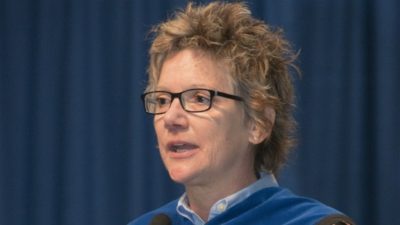Economist, UMKC Alumna says ‘Yes!’
As the cost of higher education continues to increase, so does the discussion about the value of a college degree. Students and parents continue to ask if the degree is worth the price tag.
One of the nation’s leading scholars in economics and public policy, Mary C. Daly, says the answer is a resounding “Yes!”
Daly, a UMKC alumna, is senior vice president and associate director of research at the Federal Reserve Bank of San Francisco. She has studied income inequality and the financial benefits of a college degree for three decades. After the recent recession, Daly said she noticed a factual divide between the data in her research and what people were talking about. That left her wondering if something had changed.
“I thought it was time to go back and look at the data,” Daly said. “The answer from the research is unequivocal. College pays off. It’s still a good investment.”
Daly’s research was recently published in an essay with Yifan Cao, FRB research associate. The essay, “Does College Pay,” addressed the college earnings advantage — the premium earned with a college degree versus a high school diploma alone. Daly took the average earnings of a high school graduate and a college graduate, and calculated the difference.
“In 2011, the latest date in our sample, the average worker with a college degree earned about $20,000 more per year than the average high school graduate,” Daly and Cao reported in the essay. They found these findings to be consistent with other studies.
Although Daly also learned the earnings advantage for college graduates remained flat during the recession, the college degree paid off over time. Once the recession cleared, Daly said students with college degrees started getting the available jobs first.
With the instability of the job market and the recession recovery, Daly said she understands why people question whether the money spent on college will really pay off. And without a doubt, people have experienced business and financial success without earning a college degree. But the boost to earnings from a college degree is large and persistent, according to Daly. She said the average college graduate earns enough “extra” to recover the cost of attending most colleges in fewer than 15 years.
“A college education helps you have some insurance, economic insurance,” Daly said. That’s because earning a college degree is still the best route to getting a job with higher skills and earnings.
“It’s an investment in you and your future,” Daly said. “A college degree is an asset that becomes more valuable over the course of your work life. Can you afford not to get a college education?”
Daly said the additional benefits of a college education also need to be recognized, such as learning to think critically and learning how to work in teams. College is beneficial for a whole host of things.
“It opens a path to a future you would never have otherwise,” Daly said. “No matter where a person starts, going to college increases the chances of moving up the economic ladder. College pays. The rewards at the end will be worth it.”
University of Missouri System President Tim Wolfe has been making similar points about the economic and non-economic value of higher education in his “Show Me Value Tour” presentations. Wolfe has cited studies showing that college graduates live nine years longer than high school graduates; college graduates enjoy a higher quality of life; and college grads are less likely to lose their jobs during a recession.
Daly’s essay was one of three included in the Federal Reserve Bank of San Francisco’s 2014 Annual Report, Does College Matter. The essays highlighted the FRB’s findings on various aspects of higher education – College is still worth it, education is constantly changing and when done right, one’s education should never end. The report also includes a college calculator that can help students and their families calculate when a college investment will be recovered. Daly’s essay from the annual report can be found online, along with her episode in the FRB’s newly launched podcast, available on iTunes and Stitcher SmartRadio.

